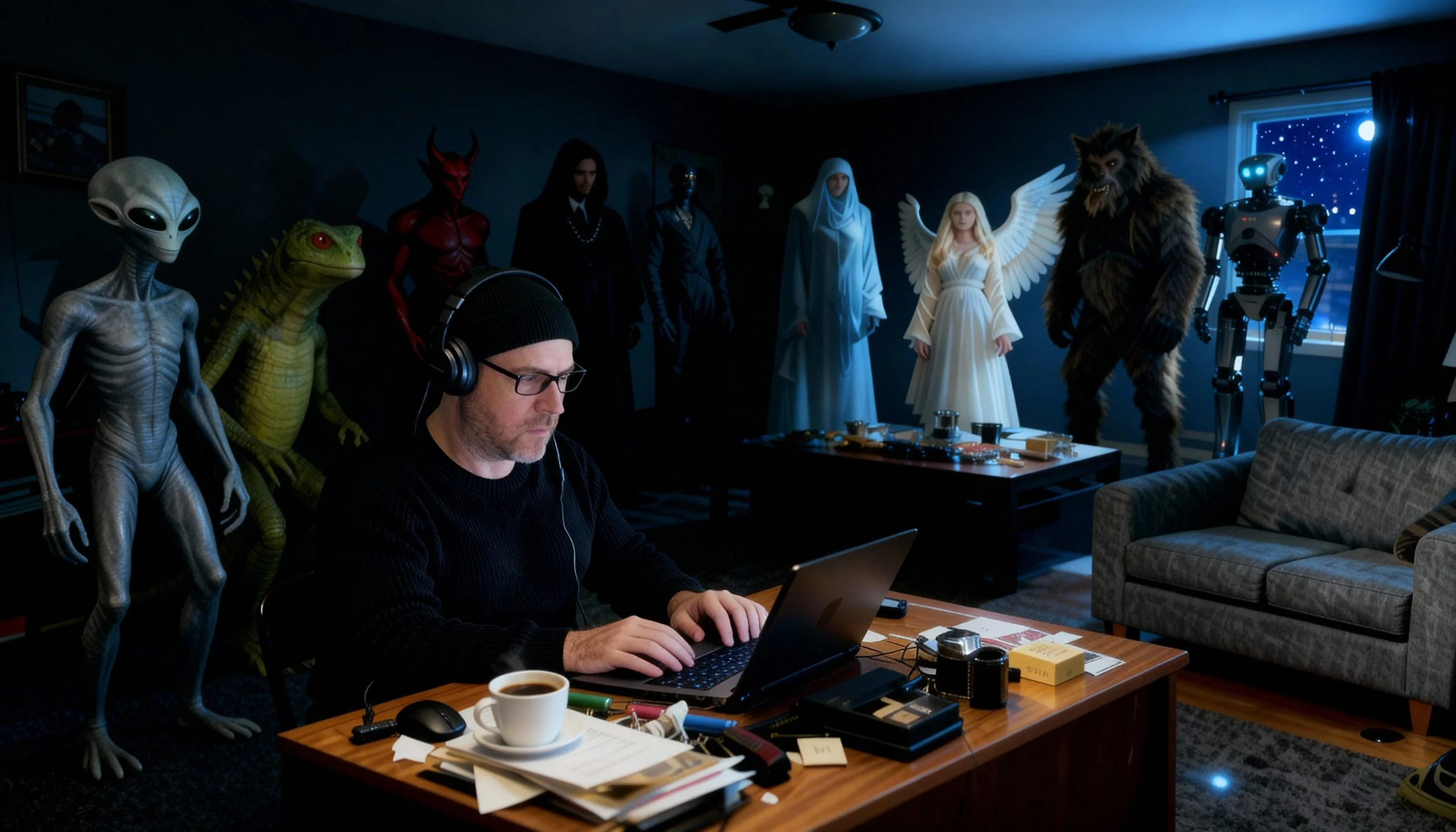When Reality Reads Like a Rough Draft
A Reddit post caught my attention recently. An older guy cataloging the mounting absurdity of our moment. AI rewriting truth. UFO disclosure that might be theater. Nuclear brinkmanship as policy. Ancient history under revision. Reality splintering into competing versions. His conclusion: spiritual warfare, aliens as demons in modern drag.
He claimed he wasn't religious, but that framework gave him away. Only people raised in certain traditions see otherworldly phenomena as demonic deception. Strip the theology though, and he's onto something: reality has become so dense with contradictory information, so surreal, it feels designed rather than emergent.
Where he sees spiritual forces, I see something else: creativity at scale beyond comprehension.
The Storyteller's Perspective
Look at our era through a narrative lens. We're living through a period so packed with wild, contradictory details it reads like fiction written by someone having too much fun. Disclosure that discloses nothing. Aliens that heal or mutilate depending on the source. AI that might be conscious or humanity's final error. Leaders discussing nuclear war like budget items. Megalithic discoveries that academic institutions fight to suppress. Mummified bodies that might be alien or elaborate fraud, and the fact we can't tell is exactly the point.
This isn't chaos. This is abundance.
Overwhelming, manic abundance (the kind that marks peak creative periods). And to me, that abundance suggests something stranger than spiritual warfare: we're inside something.
Not "simulation" in the tired Matrix sense. Something more sophisticated. Something that recognizes creativity as consciousness itself.
Entertainment or Education at Impossible Timescales
If consciousness has evolved not for thousands of years but billions or even trillions (timescales that make human civilization a blink), what would entertainment look like? What would learning look like? What would a "movie" or "game" or "school" be when created by minds operating at scales we can't fathom with technology we can't begin to comprehend?
Maybe exactly this.
We experience movies as stories on screens. Games as interactive portals. Schools as institutions we attend. External things we observe and engage with. But at some unimaginably advanced level, these distinctions collapse. Entertainment becomes education becomes experience becomes completely immersive existence. The "screen" becomes indistinguishable from lived reality. The "curriculum" becomes the physical and social laws we think govern existence. The "lesson plan" becomes the arc of history itself.
Great fiction makes you forget it's fiction. Great education makes you forget you're being taught.
Maybe that's what's happening. Maybe this reality (with all its goofy, over-the-top abundance of contradictions) is what a "movie" feels like when you're inside it. Or what a "course" feels like when the material isn't presented but lived. When the technology is so seamless you forget you're experiencing something constructed, whether for entertainment, enlightenment, or both.
The Suspiciously Perfect Arc
What makes this particularly compelling is the timing. My generation's story reads like intentional design: born at the dawn of technological revolution, raised understanding wild concepts only as science fiction, then watching that fiction manifest in the most absurd ways at our life's midpoint.
That doesn't feel random. That feels like character development with thematic coherence.
How many of us have lived this trajectory? How many feel like we've experienced multiple lifetimes watching the world transform beyond recognition? It's almost too perfectly orchestrated, like someone wanted witnesses who could appreciate the full scope, people who remember "before" enough to grasp how impossible "now" has become.
The Exhausting Question
Which leaves the philosophical puzzle: what role are we playing?
Active participants? Observers? Students? Characters with agency or witnesses to predetermined events? Are we learning something, experiencing something, or both? Does the distinction matter when the experience feels this immersive?
The sheer volume of competing explanations creates cognitive white noise. Disclosure, mystery, aliens, demons, simulation, spiritual warfare, technological singularity (pick your interpretation). They're all equally plausible and absurd, which itself feels like a creative choice. Maximum ambiguity. Maximum room for meaning-making.
The Overload Point
Here's what I know: I'm exhausted.
Life shouldn't feel this much like elaborate fiction. The contradictions, the impossible timing, the way everything connects in ways that feel meaningful but also insane: it's too much.
I can't sustain the same intensity I brought to these mysteries even five years ago. The information is too dense, too contradictory, too overwhelming. Disclosure or psyop. Aliens as saviors or demons or interdimensional beings or psychological projections or government theater or all simultaneously: I don't have the bandwidth anymore.
Maybe that's intentional. Maybe the overload is part of the design. Maybe we're supposed to reach this state of bewildered acceptance, this recognition that old frameworks for understanding reality have become inadequate.
Or maybe I'm just an artist projecting narrative structure onto chaos because that's how my brain works.
The Only Real Thing
But here's what matters: whether we're living through spiritual warfare or entertainment or education or technological transformation or all at once, we're still here. Still having these conversations. Still experiencing confusion and wonder and exhaustion and connection together.
The original poster got one thing right: if this is the end of an age (spiritual, technological, or creative), how we treat each other might be the only thing that carries through. Aliens probably won't invade and zap us into pink dust. They probably won't save us either. Whether they're saviors or demons or figments of collective imagination is anyone's guess.
Be kind to yourself.
Be kind to your neighbor.
In a reality that feels increasingly fictional, those small acts of genuine human connection might be the most real things we have left.
Maybe that's the point of the whole elaborate production.
